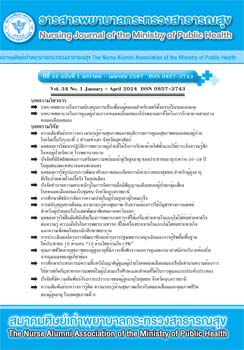ผลของการใช้รูปแบบการพัฒนาศักยภาพสมองโดยการมีส่วนร่วมของชุมชน สำหรับผู้สูงอายุที่เจ็บป่วยด้วยโรคเรื้อรัง ในเขตเมือง
Main Article Content
บทคัดย่อ
การเข้าสู่สังคมสูงวัยทำให้ประเทศไทยเผชิญกับความท้าทายต่อปัญหาสุขภาพของผู้สูงอายุ โดยเฉพาะภาวะสมองเสื่อม การป้องกันความเสื่อมของสมองให้กับผู้สูงอายุจะช่วยลดอัตราอุบัติการณ์ของภาวะสมองเสื่อมได้ การวิจัยครั้งนี้เป็นการวิจัยกึ่งทดลอง (quasi-experimental design) แบบสองกลุ่ม วัดผลก่อน-หลังการทดลอง และติดตามผล 1 เดือน โดยมีวัตถุประสงค์เพื่อศึกษาผลการใช้รูปแบบการพัฒนาศักยภาพสมองโดยการมีส่วนร่วมของชุมชน ต่อการรู้คิด ความวิตกกังวล และภาวะซึมเศร้า ของผู้สูงอายุที่มีการเจ็บป่วยเรื้อรัง ในเขตเมือง กลุ่มตัวอย่าง ประกอบด้วย ผู้สูงอายุที่เจ็บป่วยด้วยโรคเรื้อรัง ซึ่งแบ่งเป็นกลุ่มทดลอง 32 คน และกลุ่มควบคุม 32 คน เครื่องมือวิจัยประกอบด้วยรูปแบบการพัฒนาศักยภาพสมองโดยการมีส่วนร่วมของชุมชน และเครื่องมือเก็บรวบรวมข้อมูลซึ่งได้แก่แบบประเมินภาวะการรู้คิด และแบบประเมินความวิตกกังวลและภาวะซึมเศร้า วิเคราะห์ข้อมูลทั่วไปโดยใช้สถิติเชิงพรรณนา และทดสอบสมมติฐานการวิจัยด้วยสถิติอนุมานซึ่งได้แก่ Friedman test, Wilcoxon signed rank test, Mann-Whitney U-test ผลการวิจัยพบว่า รูปแบบการพัฒนาศักยภาพสมองช่วยให้การรู้คิดของกลุ่มทดลองดีกว่ากลุ่มควบคุม ทั้งหลังการทดลองและเมื่อติดตามผล 1 เดือน และช่วยลดความวิตกกังวลและภาวะซึมเศร้าในช่วงการติดตามผล 1 เดือน เมื่อเทียบภายในกลุ่มทดลอง พบว่า การรู้คิดดีขึ้นและภาวะซึมเศร้าลดลงทั้งในช่วงหลังการทดลองและติดตามผล 1 เดือน จากผลการวิจัยครั้งนี้บ่งชี้ว่า ในการนำรูปแบบการพัฒนาศักยภาพสมองไปใช้ สามารถดำเนินการให้สอดคล้องกับบริบทของพื้นที่ได้โดยการส่งเสริมให้ครอบครัว ผู้ดูแล และแกนนำชุมชนมีส่วนร่วมในการดูแล ซึ่งจะช่วยให้เกิดผลลัพธ์ที่ดีอย่างต่อเนื่องกับผู้สูงอายุที่ป่วยด้วยโรคเรื้อรัง
Article Details

อนุญาตภายใต้เงื่อนไข Creative Commons Attribution-NonCommercial-NoDerivatives 4.0 International License.
บทความและรายงานวิจัยในวารสารพยาบาลกระทรวงสาธารณสุข เป็นความคิดเห็นของ ผู้เขียน มิใช่ของคณะผู้จัดทำ และมิใช่ความรับผิดชอบของสมาคมศิษย์เก่าพยาบาลกระทรวงสาธารณสุข ซึ่งสามารถนำไปอ้างอิงได้
เอกสารอ้างอิง
World Health Organization. Towards a dementia plan: a WHO guide. Geneva: World Health Organization 2018 [internet]. 2018 [cited 2022 Feb 16]; Available from: https://www.who.int/ publications/i/item/9789241514132
Bonkhunthod, P. Manluan, K. Mild cognitive impairment: before being sick with dementia. NSO Nursing and Health Journal 2022;4(1):1-15. (in Thai).
Wongchan, J, Leethongin, M, and Piyawatanaphong, S. Effects of brain exercise programs on cognition in the elderly. Journal of the Nursing and Midwifery Council 2020;35(2):70-84. (in Thai)
Apichonkit, S, Narenpitak A, Mudkong U, Awayra P, Pholprasert P, Pichaipusit A. Effectiveness of a cognitive functions improvement program in elderly MCI patients of Primary Care Unit Network of Udonthani Hospital. Udonthani Hospital Medical Journal 2019;27(2):138-49. (in Thai).
Shankar A, Hamer M, McMunn A, Steptoe A. Social isolation and loneliness: relationships with cognitive function during 4 years of follow-up in the English longitudinal study of ageing. Psychosom Med 2013;75(2):161-70. doi: 10.1097/PSY.0b013e31827f09cd.
Nakawiro D, Chansirikarn S, Srisuwan P, Aebthaisong O, Sudsakorn P, Vidhyachak C, Visajan P. Group-based training of executive function, attention, memory and visuospatial function (Team-V) in patients with mild neurocognitive. Journal of the Psychiatry Association of Thailand 2017;62(4):337- 48. (in Thai).
Srisuwan P, Nakawiro D, Chansirikarnjana S, Kuha O, Chaikongthong P, Suwannagoot T. Effects of a group-based 8-week multicomponent cognitive training on cognition, mood and activities of daily living among healthy older adults: a one-year follow-up of a randomized controlled trial. J Prev Alzheimers Dis 2020;7(2):112-21. (in Thai).
Bueng Yitho Medical Center. Elderly statistics In Bueng Yitho Municipality, Pathum Thani Province 2020. Pathum Thani;2020. (in Thai).
World Health Organization. Integrated care for older people (ICOPE): guidance for person-centered assessment and pathways in primary care [Internet]. 2018 [cited 2020 November 15]. Available from: https://iris.who.int/bitstream/handle/10665/326843/ WHO-FWC-ALC-19.1-eng.pdf? sequence=17
World Health Organization. Integrated care for older people: guidelines on community-level interventions to manage declines in intrinsic capacity [Internet]. 2017 [cited 15 November 2020]. Available from https://apps.who.int/iris/bitstream/handle/10665/ 258981/9789241550109- eng.pdf; jsessionid=44DC73FE2A2D49BF6E2B C676E43FA08E?sequence=1.
Institute of Geriatric Medicine, Department of Medical Services, Ministry of Public Health, Faculty of Medicine Ramathibodi Hospital Mahidol University. Hand book of cognitive training in older persons with mild cognitive impairment for health care personnel. Bangkok: Sinthawee Printing; 2020. (in Thai).
Institute of Geriatric Medicine, Department of Medical Services, Ministry of Public Health, Faculty of Medicine Ramathibodi Hospital Mahidol University, Dementia Caregiver Association and the Health Promotion Foundation. Manual for developing the brain potential of elderly people who do not have memory problems (healthy memory group). [Publisher Unknown]. [Date Unknown]. (in Thai)
Srisathitnarakun B. The methodology in nursing research. Bangkok: You&I Intermedia, 2010. (in Thai).
Hemrungrojn S. MoCA Thai version 2007. In MoCA Montreal–Cognitive Assessment. [Internet]. 2011 [cited 15 November 2020]. Available from https://www.mocatest.org/wp-content/uploads/2015/ tests-instructions/MoCA-Test-Thai.pdf; 2007. (in Thai).
Limpawattana P, Tiamkao S, Sawanyawisuth K. The performance of the Rowland Universal Dementia Assessment Scale (RUDAS) for cognitive screening in a geriatric outpatient setting. Aging Clinical and Experimental Research 2012; 24:495-500. (in Thai)
Trongsakul S, Lambert R, Clark A, Wongpakaran N, Cross J. Development of the Thai version of Mini-Cog, a brief cognitive screening test. Geriatrics & Gerontology International 2015;15(5):594-600.
Nilchaikovit, T Lortrakul, M, Phisansuthideth, U. Development of Thai version of Hospital Anxiety and Depression Scale in cancer patients. Journal of the Psychiatric Association of Thailand 1996;41(1): 18-30. (in Thai).
Jitaphankul S. Important principles of geriatric medicine.3rd printing. Bangkok: Chulalongkorn Printing House-university; 2015. (in Thai).
Prasankarn S, Khammatit A, Yothathai T, Sakulku P. Screening process for early stages of dementia among elderly people in the community: A systematic review of the literature. Journal of Public Health 2017;26(1):125-38. (in Thai).
Worawatanachai P. Two hemisphere brain mechanisms and human creativity. Journal of Information 2016;15(8):1-12. (in Thai).
Buddharod P, Suwanwela S, Supasri J. Effects of a cognitive stimulation program on memory and the ability to do daily activities of elderly people with primary cognitive impairment. The Southern College Network Journal of Nursing and Public Health 2020 1:270-80. (in Thai).
Duangkaew J, Luangpitak W, Mahaphrom T, Chatrung C, Noprujchinda S. Effects of the brain potential development program on the cognitive ability of the elderly have impaired cognition Initial stage. Journal of Health and Nursing Research 2021;37(3):129-41. (in Thai).
Limpawattana P, Manjavong M. Mild cognitive impairment. KKU Journal of Medicine 2020; 6(1): 25-35. (in Thai).
Jindawattanawong P, Kasakamon K. Srisuwan P. Prevalence and relationship between social media addiction and depression and anxiety in elderly people receiving services. at the family medicine examination clinic Phramongkutklao Hospital. Journal of Public Health and Health Sciences 2020;5(3):81-97. (in Thai).
Naejon J. Brain and emotions: the amazing connection. Rajapruek Journal 2015;13(3): 9-19.(in Thai).
Stahl ST, Rodakowski J, Gildengers AG, Reynolds CF, Morse JQ, Rico K, et al. Treatment considerations for depression research in older married couples: a dyadic case study. American Journal of Geriatric Psychiatry 2017;25(4):388–95. doi: 10.1016/j.jagp.2016.12.013

